中学生英语听力焦虑问卷调查表
- 格式:doc
- 大小:26.50 KB
- 文档页数:1
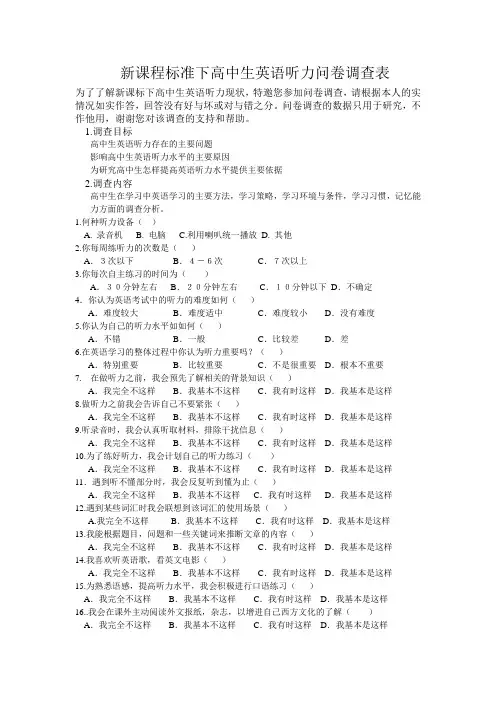
新课程标准下高中生英语听力问卷调查表为了了解新课标下高中生英语听力现状,特邀您参加问卷调查,请根据本人的实情况如实作答,回答没有好与坏或对与错之分。
问卷调查的数据只用于研究,不作他用,谢谢您对该调查的支持和帮助。
1.调查目标高中生英语听力存在的主要问题影响高中生英语听力水平的主要原因为研究高中生怎样提高英语听力水平提供主要依据2.调查内容高中生在学习中英语学习的主要方法,学习策略,学习环境与条件,学习习惯,记忆能力方面的调查分析。
1.何种听力设备()A. 录音机B. 电脑C.利用喇叭统一播放D. 其他2.你每周练听力的次数是()A.3次以下B.4-6次C.7次以上3.你每次自主练习的时间为()A.30分钟左右B.20分钟左右C.10分钟以下D.不确定4.你认为英语考试中的听力的难度如何()A.难度较大B.难度适中C.难度较小D.没有难度5.你认为自己的听力水平如如何()A.不错B.一般C.比较差D.差6.在英语学习的整体过程中你认为听力重要吗?()A.特别重要B.比较重要C.不是很重要D.根本不重要7. 在做听力之前,我会预先了解相关的背景知识()A.我完全不这样B.我基本不这样C.我有时这样D.我基本是这样8.做听力之前我会告诉自己不要紧张()A.我完全不这样B.我基本不这样C.我有时这样D.我基本是这样9.听录音时,我会认真听取材料,排除干扰信息()A.我完全不这样B.我基本不这样C.我有时这样D.我基本是这样10.为了练好听力,我会计划自己的听力练习()A.我完全不这样B.我基本不这样C.我有时这样D.我基本是这样11.遇到听不懂部分时,我会反复听到懂为止()A.我完全不这样B.我基本不这样C.我有时这样D.我基本是这样12.遇到某些词汇时我会联想到该词汇的使用场景()A.我完全不这样B.我基本不这样C.我有时这样D.我基本是这样13.我能根据题目,问题和一些关键词来推断文章的内容()A.我完全不这样B.我基本不这样C.我有时这样D.我基本是这样14.我喜欢听英语歌,看英文电影()A.我完全不这样B.我基本不这样C.我有时这样D.我基本是这样15.为熟悉语感,提高听力水平,我会积极进行口语练习()A.我完全不这样B.我基本不这样C.我有时这样D.我基本是这样16..我会在课外主动阅读外文报纸,杂志,以增进自己西方文化的了解()A.我完全不这样B.我基本不这样C.我有时这样D.我基本是这样17.我习惯与别人一起练习听力,交流彼此学习感受()A.我完全不这样B.我基本不这样C.我有时这样D.我基本是这样18平时对学生的听力训练采用哪些方式?__________________________________________________________________________________________参考文献[1]施萍,浅谈如何提高学生的英语听力能力[J].青少年日记(教育教学研究);2011(4)33-34[2]刘满堂,试谈英语听力理解训练中的细节识记[J].陕西教育学院学报,1998(3):80-83[3]谭家禅,听力障碍的剖析与治理[J].江苏外语教育研究,1998(2):30-33[4]金艳丽,浅谈如何提高高中生英语听力能力[J].学周刊;2011(13):20-22[5]汪学立,如何提高学生英语听力效率[J].外语界,1999(3)44-47[6]汪兴权,图式理论在听力理解中的作用与应用[J].四川师范学院学报(哲社版).1999(1):103-106。
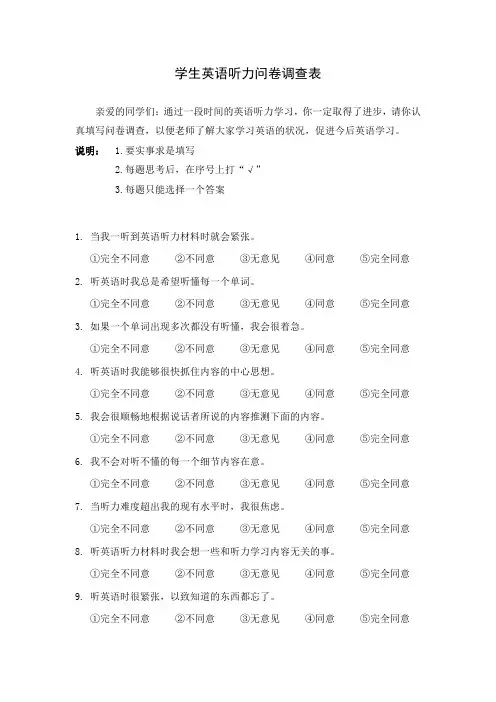
学生英语听力问卷调查表亲爱的同学们:通过一段时间的英语听力学习,你一定取得了进步,请你认真填写问卷调查,以便老师了解大家学习英语的状况,促进今后英语学习。
说明: 1.要实事求是填写2.每题思考后,在序号上打“√”3.每题只能选择一个答案1. 当我一听到英语听力材料时就会紧张。
①完全不同意②不同意③无意见④同意⑤完全同意2. 听英语时我总是希望听懂每一个单词。
①完全不同意②不同意③无意见④同意⑤完全同意3. 如果一个单词出现多次都没有听懂,我会很着急。
①完全不同意②不同意③无意见④同意⑤完全同意4. 听英语时我能够很快抓住内容的中心思想。
①完全不同意②不同意③无意见④同意⑤完全同意5. 我会很顺畅地根据说话者所说的内容推测下面的内容。
①完全不同意②不同意③无意见④同意⑤完全同意6. 我不会对听不懂的每一个细节内容在意。
①完全不同意②不同意③无意见④同意⑤完全同意7. 当听力难度超出我的现有水平时,我很焦虑。
①完全不同意②不同意③无意见④同意⑤完全同意8. 听英语听力材料时我会想一些和听力学习内容无关的事。
①完全不同意②不同意③无意见④同意⑤完全同意9. 听英语时很紧张,以致知道的东西都忘了。
①完全不同意②不同意③无意见④同意⑤完全同意10. 上英语听力课时,我担心课堂学习失败。
①完全不同意②不同意③无意见④同意⑤完全同意11. 当我听不懂老师用英语纠正我的错误时,我会感到不安。
①完全不同意②不同意③无意见④同意⑤完全同意12. 总是会想到其他同学的听力比我好。
①完全不同意②不同意③无意见④同意⑤完全同意13. 我不明白为什么有些人不喜欢上听力课。
①完全不同意②不同意③无意见④同意⑤完全同意14. 我希望老师不要在课堂进行随堂听力测试。
①完全不同意②不同意③无意见④同意⑤完全同意15. 听力测试准备的很充分,但还是感到紧张。
①完全不同意②不同意③无意见④同意⑤完全同意16. 我在英语听力测试中很放松。

英语听力焦虑调查问卷1、听英语时,我容易卡在一两个不认识的词上。
【单选题】○ 完全不同意○ 基本不同意○ 有时同意○ 基本同意○ 完全同意2、英语听力测试时,如果只播放一遍听力材料,我会感到紧张。
【单选题】○ 完全不同意○ 基本不同意○ 有时同意○ 基本同意○ 完全同意3、如果别人的英语发音和我的不一样,我会觉得很难听懂。
【单选题】○ 完全不同意○ 基本不同意○ 有时同意○ 基本同意○ 完全同意4、如果讲话人说英语速度非常快,我会担心不能全部听懂。
【单选题】○ 完全不同意○ 基本不同意○ 有时同意○ 基本同意○ 完全同意5、如果我对听力材料的话题不熟悉,我会感到紧张。
【单选题】○ 完全不同意○ 基本不同意○ 有时同意○ 基本同意○ 完全同意6、听英语时,我很容易猜测出漏听部分的内容。
【单选题】○ 完全不同意○ 基本不同意○ 有时同意○ 基本同意○ 完全同意7、听英语时,若稍微走神,我会担心错过重要内容。
【单选题】○ 完全不同意○ 基本不同意○ 有时同意○ 基本同意○ 完全同意8、听英语时,若看不到讲话人的口型或是面部表情,我会感到担心。
【单选题】○ 完全不同意○ 基本不同意○ 有时同意○ 基本同意○ 完全同意9、英语听力测试中,若不能听明白每一个单词,我就会感到紧张慌乱。
【单选题】○ 完全不同意○ 基本不同意○ 有时同意○ 基本同意○ 完全同意10、听英语时,我很难辨别开不同的单词。
【单选题】○ 完全不同意○ 基本不同意○ 有时同意○ 基本同意○ 完全同意11、英语听力课上,若没有相关的文本材料可供参考,我会感到不安。
【单选题】○ 完全不同意○ 基本不同意○ 有时同意○ 基本同意○ 完全同意12、我很难听懂课堂上老师的英文讲解。
【单选题】○ 完全不同意○ 基本不同意○ 有时同意○ 基本同意○ 完全同意13、我很难集中精力听别人讲的英语内容,除非是熟人。
【单选题】○ 完全不同意○ 基本不同意○ 有时同意○ 基本同意○ 完全同意14、听英语时,我感到很不自信。
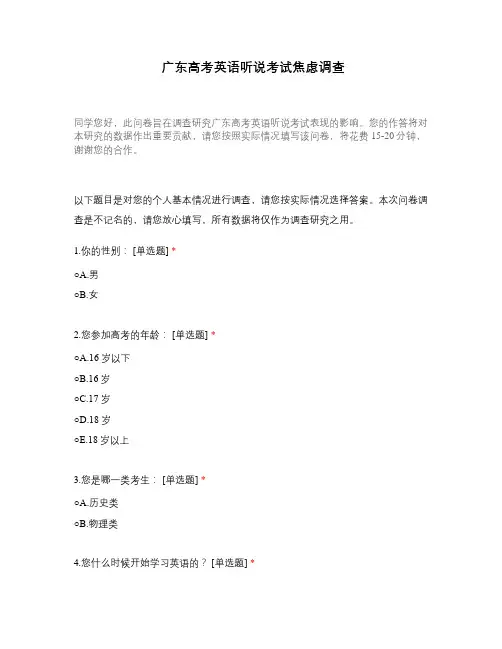
广东高考英语听说考试焦虑调查同学您好,此问卷旨在调查研究广东高考英语听说考试表现的影响。
您的作答将对本研究的数据作出重要贡献,请您按照实际情况填写该问卷,将花费15-20分钟,谢谢您的合作。
以下题目是对您的个人基本情况进行调查,请您按实际情况选择答案。
本次问卷调查是不记名的,请您放心填写,所有数据将仅作为调查研究之用。
1.你的性别: [单选题] *○A.男○B.女2.您参加高考的年龄: [单选题] *○A.16岁以下○B.16岁○C.17岁○D.18岁○E.18岁以上3.您是哪一类考生: [单选题] *○A.历史类○B.物理类4.您什么时候开始学习英语的? [单选题] *○B.一年级○C.二年级○D.三年级○E.三年级之后5.过去一年您在英语课堂上说英语的频率是? [单选题] *○A.从不○B.偶尔○C.有时○D.经常○E.总是6. 过去一年您在课余时间说英语的频率是? [单选题] *○A.从不○B.偶尔○C.有时○D.经常○E.总是7. 在高三一年,您平常自己练习模拟英语听说考试的频率是? [单选题] *○A.从不○B.偶尔○C.有时○D.经常8. 您看英语电影、电视节目或听英文歌曲的频率? [单选题] *○A.从不○B.偶尔○C.有时○D.经常○E.总是9. 您在过去跟英语母语者交流的频率是? [单选题] *○A.从不○B.偶尔○C.有时○D.经常○E.总是10. 与您同学相比,您认为您的英语听说能力在哪个层次? [单选题] *○A.低,我无法进行英语听说○B.较低,我能进行简单的英语听说○C.中等,我能进行日常所需的英语听说○D.较高,我能大致进行英语听说○E.高,我能流利地进行英语听说11.您的高考听说成绩区间为: [单选题] *○A.10分以下○C.14-16○D.16-18○E.18及以上以下题目是对您就广东高考听说考试以及平常您在英语学习中的感受进行调查,请如实选择您认为最符合自身情况的选项。
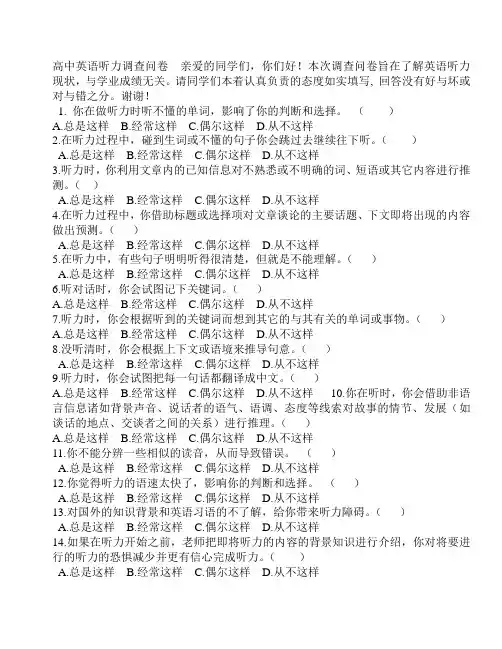
高中英语听力调查问卷亲爱的同学们,你们好!本次调查问卷旨在了解英语听力现状,与学业成绩无关。
请同学们本着认真负责的态度如实填写, 回答没有好与坏或对与错之分。
谢谢!1. 你在做听力时听不懂的单词,影响了你的判断和选择。
()A.总是这样B.经常这样C.偶尔这样D.从不这样2.在听力过程中,碰到生词或不懂的句子你会跳过去继续往下听。
()A.总是这样B.经常这样C.偶尔这样D.从不这样3.听力时,你利用文章内的已知信息对不熟悉或不明确的词、短语或其它内容进行推测。
()A.总是这样B.经常这样C.偶尔这样D.从不这样4.在听力过程中,你借助标题或选择项对文章谈论的主要话题、下文即将出现的内容做出预测。
()A.总是这样B.经常这样C.偶尔这样D.从不这样5.在听力中,有些句子明明听得很清楚,但就是不能理解。
()A.总是这样B.经常这样C.偶尔这样D.从不这样6.听对话时,你会试图记下关键词。
()A.总是这样B.经常这样C.偶尔这样D.从不这样7.听力时,你会根据听到的关键词而想到其它的与其有关的单词或事物。
()A.总是这样B.经常这样C.偶尔这样D.从不这样8.没听清时,你会根据上下文或语境来推导句意。
()A.总是这样B.经常这样C.偶尔这样D.从不这样9.听力时,你会试图把每一句话都翻译成中文。
()A.总是这样B.经常这样C.偶尔这样D.从不这样10.你在听时,你会借助非语言信息诸如背景声音、说话者的语气、语调、态度等线索对故事的情节、发展(如谈话的地点、交谈者之间的关系)进行推理。
()A.总是这样B.经常这样C.偶尔这样D.从不这样11.你不能分辨一些相似的读音,从而导致错误。
()A.总是这样B.经常这样C.偶尔这样D.从不这样12.你觉得听力的语速太快了,影响你的判断和选择。
()A.总是这样B.经常这样C.偶尔这样D.从不这样13.对国外的知识背景和英语习语的不了解,给你带来听力障碍。
()A.总是这样B.经常这样C.偶尔这样D.从不这样14.如果在听力开始之前,老师把即将听力的内容的背景知识进行介绍,你对将要进行的听力的恐惧减少并更有信心完成听力。
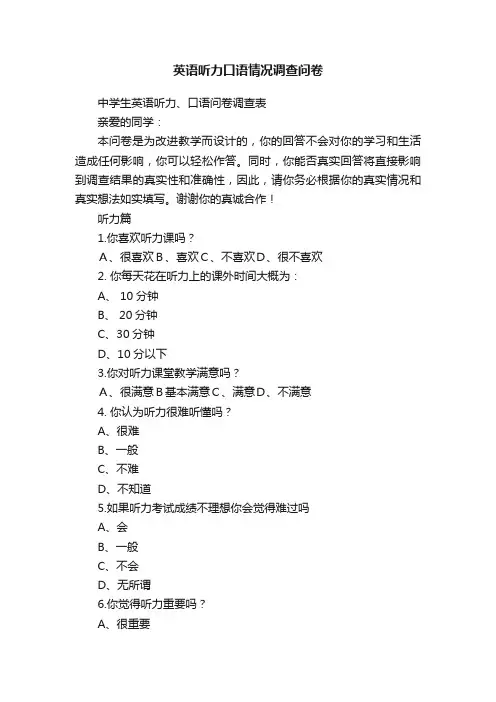
英语听力口语情况调查问卷中学生英语听力、口语问卷调查表亲爱的同学:本问卷是为改进教学而设计的,你的回答不会对你的学习和生活造成任何影响,你可以轻松作答。
同时,你能否真实回答将直接影响到调查结果的真实性和准确性,因此,请你务必根据你的真实情况和真实想法如实填写。
谢谢你的真诚合作!听力篇1.你喜欢听力课吗?A、很喜欢B、喜欢C、不喜欢D、很不喜欢2. 你每天花在听力上的课外时间大概为:A、 10分钟B、 20分钟C、30分钟D、10分以下3.你对听力课堂教学满意吗?A、很满意B基本满意C、满意D、不满意4. 你认为听力很难听懂吗?A、很难B、一般C、不难D、不知道5.如果听力考试成绩不理想你会觉得难过吗A、会B、一般C、不会D、无所谓6.你觉得听力重要吗?A、很重要B、重要C、一般D、无所谓7.你认为通过努力听力成绩可以达到?A、优秀B、良好C、合格D、不合格8.你认为自己听力没学好的原因在于?A、自己B、家长C、老师D、校风E、以上都有9.你在听力课上的表现如何?A、很积极B、一般C、不积极10. 你在做听力时听不懂的单词,影响了你的判断和选择。
A.总是这样B.经常这样C.偶尔这样D.从不这样11.在听力过程中,碰到生词或不懂的句子你会跳过去继续往下听。
A.总是这样B.经常这样C.偶尔这样D.从不这样12.听力时,你利用文章内的已知信息对不熟悉或不明确的词、短语或其它内容进行推测。
B.经常这样C.偶尔这样D.从不这样13.在听力过程中,你借助标题或选择项对文章谈论的主要话题、下文即将出现的内容做出预测。
A.总是这样B.经常这样C.偶尔这样D.从不这样14.在听力中,有些句子明明听得很清楚,但就是不能理解。
A.总是这样B.经常这样C.偶尔这样D.从不这样15.听对话时,你会试图记下关键词。
A.总是这样B.经常这样C.偶尔这样D.从不这样16.听力时,你会根据听到的关键词而想到其它的与其有关的单词或事物。
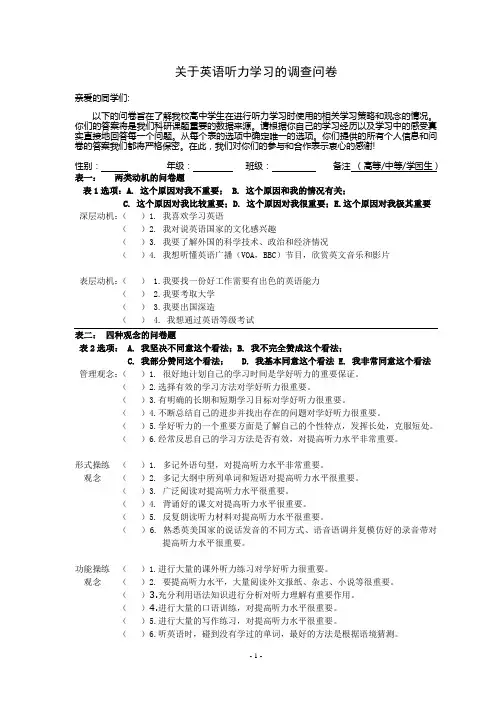
关于英语听力学习的调查问卷亲爱的同学们:以下的问卷旨在了解我校高中学生在进行听力学习时使用的相关学习策略和观念的情况。
你们的答案将是我们科研课题重要的数据来源。
请根据你自己的学习经历以及学习中的感受真实直接地回答每一个问题。
从每个表的选项中确定唯一的选项。
你们提供的所有个人信息和问卷的答案我们都将严格保密。
在此,我们对你们的参与和合作表示衷心的感谢!性别:年级:班级:备注(高等/中等/学困生)表一:两类动机的问卷题表1选项:A. 这个原因对我不重要; B. 这个原因和我的情况有关;C. 这个原因对我比较重要;D. 这个原因对我很重要;E.这个原因对我极其重要深层动机:()1. 我喜欢学习英语()2. 我对说英语国家的文化感兴趣()3. 我要了解外国的科学技术、政治和经济情况()4. 我想听懂英语广播(VOA,BBC)节目,欣赏英文音乐和影片表层动机:() 1.我要找一份好工作需要有出色的英语能力() 2.我要考取大学() 3.我要出国深造() 4. 我想通过英语等级考试表二:四种观念的问卷题表2选项: A. 我坚决不同意这个看法;B. 我不完全赞成这个看法;C. 我部分赞同这个看法;D. 我基本同意这个看法E. 我非常同意这个看法管理观念:()1. 很好地计划自己的学习时间是学好听力的重要保证。
()2.选择有效的学习方法对学好听力很重要。
()3.有明确的长期和短期学习目标对学好听力很重要。
()4.不断总结自己的进步并找出存在的问题对学好听力很重要。
()5.学好听力的一个重要方面是了解自己的个性特点,发挥长处,克服短处。
()6.经常反思自己的学习方法是否有效,对提高听力水平非常重要。
形式操练()1. 多记外语句型,对提高听力水平非常重要。
观念()2. 多记大纲中所列单词和短语对提高听力水平很重要。
()3. 广泛阅读对提高听力水平很重要。
()4. 背诵好的课文对提高听力水平很重要。
()5. 反复朗读听力材料对提高听力水平很重要。
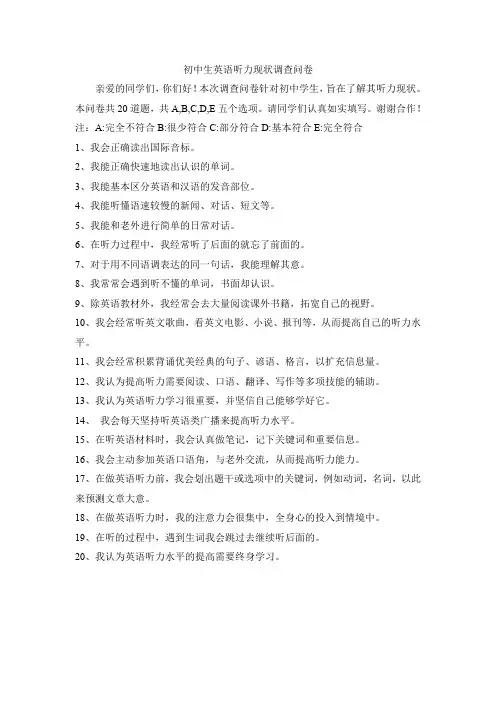
初中生英语听力现状调查问卷亲爱的同学们,你们好!本次调查问卷针对初中学生,旨在了解其听力现状。
本问卷共20道题,共A,B,C,D,E五个选项。
请同学们认真如实填写。
谢谢合作!注:A:完全不符合B:很少符合C:部分符合D:基本符合E:完全符合1、我会正确读出国际音标。
2、我能正确快速地读出认识的单词。
3、我能基本区分英语和汉语的发音部位。
4、我能听懂语速较慢的新闻、对话、短文等。
5、我能和老外进行简单的日常对话。
6、在听力过程中,我经常听了后面的就忘了前面的。
7、对于用不同语调表达的同一句话,我能理解其意。
8、我常常会遇到听不懂的单词,书面却认识。
9、除英语教材外,我经常会去大量阅读课外书籍,拓宽自己的视野。
10、我会经常听英文歌曲,看英文电影、小说、报刊等,从而提高自己的听力水平。
11、我会经常积累背诵优美经典的句子、谚语、格言,以扩充信息量。
12、我认为提高听力需要阅读、口语、翻译、写作等多项技能的辅助。
13、我认为英语听力学习很重要,并坚信自己能够学好它。
14、我会每天坚持听英语类广播来提高听力水平。
15、在听英语材料时,我会认真做笔记,记下关键词和重要信息。
16、我会主动参加英语口语角,与老外交流,从而提高听力能力。
17、在做英语听力前,我会划出题干或选项中的关键词,例如动词,名词,以此来预测文章大意。
18、在做英语听力时,我的注意力会很集中,全身心的投入到情境中。
19、在听的过程中,遇到生词我会跳过去继续听后面的。
20、我认为英语听力水平的提高需要终身学习。
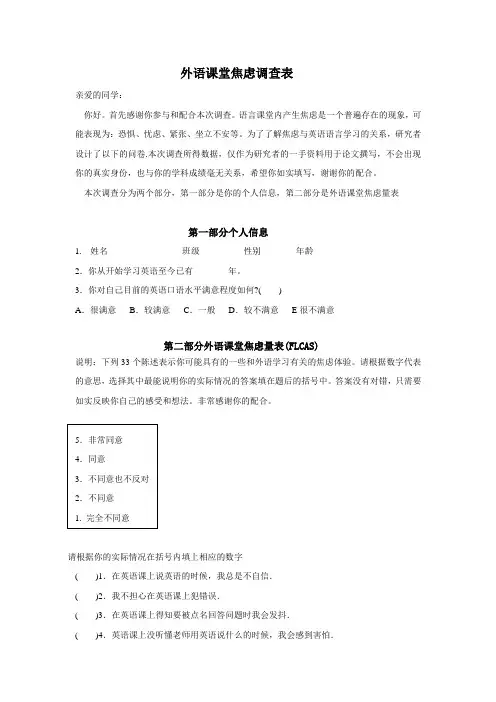
外语课堂焦虑调查表亲爱的同学:你好。
首先感谢你参与和配合本次调查。
语言课堂内产生焦虑是一个普遍存在的现象,可能表现为:恐惧、忧虑、紧张、坐立不安等。
为了了解焦虑与英语语言学习的关系,研究者设计了以下的问卷.本次调查所得数据,仅作为研究者的一手资料用于论文撰写,不会出现你的真实身份,也与你的学科成绩毫无关系,希望你如实填写,谢谢你的配合。
本次调查分为两个部分,第一部分是你的个人信息,第二部分是外语课堂焦虑量表第一部分个人信息1. 姓名_________________班级__________性别________年龄__________2.你从开始学习英语至今已有________年。
3.你对自己目前的英语口语水平满意程度如何?( )A.很满意B.较满意C.一般D.较不满意E很不满意第二部分外语课堂焦虑量表(FLCAS)说明:下列33个陈述表示你可能具有的一些和外语学习有关的焦虑体验。
请根据数字代表的意思,选择其中最能说明你的实际情况的答案填在题后的括号中。
答案没有对错,只需要如实反映你自己的感受和想法。
非常感谢你的配合。
5.非常同意4.同意3.不同意也不反对2.不同意1. 完全不同意请根据你的实际情况在括号内填上相应的数字( )1.在英语课上说英语的时候,我总是不自信.( )2.我不担心在英语课上犯错误.( )3.在英语课上得知要被点名回答问题时我会发抖.( )4.英语课上没听懂老师用英语说什么的时候,我会感到害怕.( )5.我并不反感多上一些英语课.( )6.在英语课上,我时常想一些与上课无关的内容.( )7.我总觉得别的同学英语比我好.( )8.英语测验时,我通常都感觉很自在.( )9.英语课上做没有准备的发言时,我感到很紧张.( )l0.我担心因为英语考试不及格所带来的后果.( )11.我不能理解为什么有些人会对英语课如此不安.( )12.英语课上我能紧张的连知道的东西都忘了.( )13.在英语课上主动回答问题让我觉得尴尬.( )14.与英语国家的人说英语的时候我不会紧张.( )15.听不懂老师纠错时我会很不自在.( )16.我即便对英语课准备得很充分,却还是感到不安.( )17.我经常不想去上英语课.( )18.在英语课上发言时,我觉得很自信.( )19.我很害怕我的英语老师动不动纠正我犯的每一个错误.( )20.即将被老师点名发言时,我感到心跳得很厉害.( )21.英语考试前,我越复习越没底.( )22.要为英语课做充分的准备,对此我没有压力.( )23.总觉得别的同学英语说得比我好.( )24.在别的同学面前说英语我感到不自在.·( )25.英语课的进度很快,我担心跟不上.( )26.英语课是最令我紧张不安的一门课.( )27.在英语课上发言时,我感觉既紧张又头脑混乱.( )28.去上英语课的路上,我感觉自信和轻松.( )29.英语课上,当我不能理解老师说的每个词时,我会感到紧张.( )30.说英语要掌握那么多规则,我感觉吃不消.( )31.我说英语的时候担心被别的同学取笑.( )32.跟外国人呆在一块儿的时候我可能会感觉很自在.( )33.英语老师问一些我事先没有准备的问题时,我很紧张.。
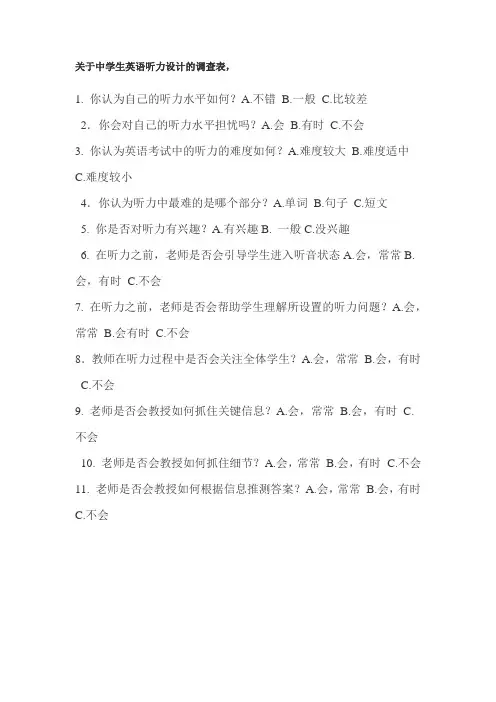
关于中学生英语听力设计的调查表,
1. 你认为自己的听力水平如何?A.不错B.一般C.比较差
2.你会对自己的听力水平担忧吗?A.会B.有时C.不会
3. 你认为英语考试中的听力的难度如何?A.难度较大B.难度适中
C.难度较小
4.你认为听力中最难的是哪个部分?A.单词B.句子C.短文
5. 你是否对听力有兴趣?A.有兴趣B. 一般C.没兴趣
6. 在听力之前,老师是否会引导学生进入听音状态A.会,常常B.会,有时C.不会
7. 在听力之前,老师是否会帮助学生理解所设置的听力问题?A.会,常常B.会有时C.不会
8.教师在听力过程中是否会关注全体学生?A.会,常常B.会,有时
C.不会
9. 老师是否会教授如何抓住关键信息?A.会,常常B.会,有时C.不会
10. 老师是否会教授如何抓住细节?A.会,常常B.会,有时C.不会
11. 老师是否会教授如何根据信息推测答案?A.会,常常B.会,有时
C.不会。
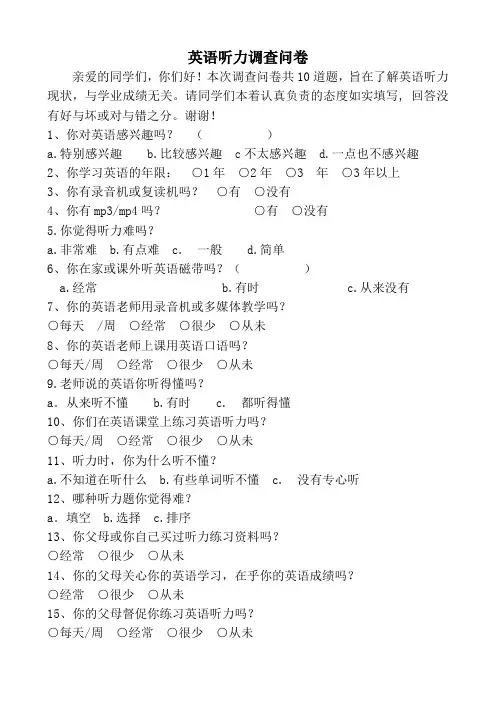
英语听力调查问卷
亲爱的同学们,你们好!本次调查问卷共10道题,旨在了解英语听力现状,与学业成绩无关。
请同学们本着认真负责的态度如实填写, 回答没有好与坏或对与错之分。
谢谢!
1、你对英语感兴趣吗?()
a.特别感兴趣
b.比较感兴趣 c不太感兴趣 d.一点也不感兴趣
2、你学习英语的年限:○1年○2年○3 年○3年以上
3、你有录音机或复读机吗?○有○没有
4、你有mp3/mp4吗?○有○没有
5.你觉得听力难吗?
a.非常难
b.有点难
c. 一般
d.简单
6、你在家或课外听英语磁带吗?()
a.经常
b.有时
c.从来没有
7、你的英语老师用录音机或多媒体教学吗?
○每天 /周○经常○很少○从未
8、你的英语老师上课用英语口语吗?
○每天/周○经常○很少○从未
9.老师说的英语你听得懂吗?
a.从来听不懂 b.有时 c. 都听得懂
10、你们在英语课堂上练习英语听力吗?
○每天/周○经常○很少○从未
11、听力时,你为什么听不懂?
a.不知道在听什么
b.有些单词听不懂
c. 没有专心听
12、哪种听力题你觉得难?
a.填空 b.选择 c.排序
13、你父母或你自己买过听力练习资料吗?
○经常○很少○从未
14、你的父母关心你的英语学习,在乎你的英语成绩吗?
○经常○很少○从未
15、你的父母督促你练习英语听力吗?
○每天/周○经常○很少○从未。
英语听力状况检盘问性别年纪@请在最切合您个人状况的答案上打钩你以为你的听力水平你均匀每日听英语听力的时间A0~10分钟B10~30分钟C30~60分钟D1~2小时E2小时以上你平常爱看相关英语的书本或电影吗?你有一套优秀的英语听力技巧吗?A从不着重技巧B有一点技巧C具备必定的技巧D应用技巧能力较好E有很好的听力技巧@请在最切合您个人状况的答案上打钩当英语老师用英语发问时,我会很紧张A完整不切合我的状况B不是很切合我的状况C不确立D较切合我的状况E完整切合我的状况听英语时有背景噪音,我就感觉很浮躁A完整不切合我的状况B不是很切合我的状况C不确立D较切合我的状况E完整切合我的状况听英语时,几个词听不懂,令我很担忧A完整不切合我的状况B不是很切合我的状况C不确立D较切合我的状况E完整切合我的状况上课时老师讲英语就感觉紧张A完整不切合我的状况B不是很切合我的状况C不确立D较切合我的状况E完整切合我的状况听英语时又不熟习的资料,就感觉紧张A完整不切合我的状况B不是很切合我的状况C不确立D较切合我的状况E完整切合我的状况听他人讲英语我听不懂A完整不切合我的状况B不是很切合我的状况C不确立D较切合我的状况E完整切合我的状况在考试的时候,本来简单的短文,紧张一下子都听不懂了A完整不切合我的状况B不是很切合我的状况C不确立D较切合我的状况E完整切合我的状况听英语时,我很简单被一两个没学过的词莫非A完整不切合我的状况B不是很切合我的状况C不确立D较切合我的状况E完整切合我的状况假如听听力时,音量较小我担忧没法听懂A完整不切合我的状况B不是很切合我的状况C不确立D较切合我的状况E完整切合我的状况在进行英语听力考试的时候,我紧张得没法静下心来听A完整不切合我的状况B不是很切合我的状况C不确立D较切合我的状况E完整切合我的状况听英语时,假如遇到构造长的句子,我会感觉不安A完整不切合我的状况B不是很切合我的状况C不确立D较切合我的状况E完整切合我的状况在听英语时,只好听一遍时,我感觉紧张A完整不切合我的状况B不是很切合我的状况C不确立D较切合我的状况E完整切合我的状况在听英语时,稍有不集中注意,就感觉没法填补A完整不切合我的状况B不是很切合我的状况C不确立D较切合我的状况E完整切合我的状况听听力时,由于紧张,记不住处听的内容A完整不切合我的状况B不是很切合我的状况C不确立D较切合我的状况E完整切合我的状况听到英语重要信息是,脑海一片空白A完整不切合我的状况B不是很切合我的状况C不确立D较切合我的状况E完整切合我的状况英语听力状况检盘问姓名性别年纪@请在最切合您个人状况的答案上打钩在此次听力考试中能否利用时间进行预读是B不是在此次听力开始时能否有自信能做好题目是B不是能否在此次听力中抓住主要的信息是B不是遇到不懂得词,能否能从上下文中猜意思是B不是这两段会话中,相关教育的能否比科学的简单是B不是在此次英语听力测试中你感觉紧张是B不是当你听到相关教育的话题听力时松了一口气A是B不是。
尊敬的同学们:您好!为了更好地了解初中生在听力方面的现状,以及我们在听力教学和辅导中存在的问题和改进方向,我们特设计了这份调查问卷。
您的宝贵意见将对我们的工作产生重要影响。
本问卷采取匿名方式,所有信息仅用于统计分析,请您放心填写。
感谢您的支持与配合!一、基本信息1. 您的性别是:()男()女2. 您所在的年级是:()七年级()八年级()九年级3. 您所在的班级是:(请填写班级名称)二、听力学习情况4. 您每天用于听力练习的时间大约是多少?()少于30分钟()30-60分钟()1小时以上5. 您主要通过以下哪些方式学习英语听力?(可多选)()教材配套听力材料()英语广播、电视节目()英语歌曲、电影()在线英语听力平台()其他:(请说明)6. 您认为以下哪些因素对您的英语听力学习帮助最大?(可多选)()教师讲解()同学互助()家长监督()自主学习()其他:(请说明)7. 您在学习英语听力时,遇到的主要困难有哪些?(可多选)()词汇量不足()语法知识掌握不牢固()发音不标准()听力材料难度过大()其他:(请说明)三、听力教学与辅导8. 您对目前的英语听力教学方法是否满意?()非常满意()满意()一般()不满意()非常不满意9. 您认为英语听力教学中,以下哪些方面需要改进?(可多选)()听力材料的选择和难度()教师的讲解和示范()课堂互动和练习()课后辅导和作业布置()其他:(请说明)10. 您是否参加过英语听力培训班或辅导课程?()是()否11. 如果参加过,您对培训班或辅导课程的效果满意吗?()非常满意()满意()一般()不满意()非常不满意12. 您认为培训班或辅导课程在以下哪些方面对您的英语听力提高有帮助?(可多选)()听力技巧和方法()词汇和语法知识()听力材料的丰富性()教师的指导()其他:(请说明)四、其他建议13. 您对英语听力教学还有什么其他建议或意见?(请在此处畅所欲言)感谢您抽出宝贵时间完成这份问卷!您的反馈对我们改进教学具有重要意义。
初中英语听力水平调查问卷1、您是哪个年级的学生?【单选题】○ 初一○ 初二○ 初三2、您认为您的英语口语如何?【单选题】○ 很好○ 一般○ 较差3、听听力时,您不懂的词汇有多少?【单选题】○ 很多○ 一部分○ 很少4、您会经常听英语听力吗?【单选题】○ 一周4次以上○ 一周2-3次○ 一周1次○ 从不5、您的听力成绩在什么时候更好一些?【单选题】○ 考试时○ 课堂练习时○ 课后自主练习时6、在听力测试时,您会根据相关题目和选项内容预测文章大意吗?【单选题】○ 会○ 不会○ 有时会7、您觉得注意力对听力有影响吗?【单选题】○ 有○ 没有○ 有是有8、在听英语过程中,您认为听哪种听力材料更有助于提高听力成绩?【单选题】○ 感兴趣的材料○ 教材听力材料○ 其他材料9、您觉得了解听力材料的背景知识会提高你的听力水平吗?【单选题】○ 会○ 不会○ 可能会10、您更喜欢上哪种类型的听力课?【单选题】○ 活跃有趣型○ 传统教师主导型○ 其他类型11、您觉得增加词汇量,提高语法水平对听力提高有帮助吗?【单选题】○ 有○ 没有○ 可能有12、您觉得平时的听力练习材料有什么缺点?【多选题】□ 生词多□ 语速快□ 句子长□ 英语习语太多□ 其他13、您更倾向于下列哪种提高英语听力水平的方式?【多选题】□ 看美剧□ 听英文歌曲□ 多听教材听力材料□ 其他14、您对哪种听力课堂更感兴趣?请提出一些合理化建议:【填空题】________________________。
初中生英语听力现状调查问卷为了解初中生的英语水平,特制定《初中生英语听力现状调查问卷》,感谢您的参与。
1.你对现在的英语学习是否有兴趣? ________A.很有兴趣B.比较有兴趣C.有一点兴趣D.没有兴趣2.对自身的英语听力水平满意吗?__________A. 非常满意B. 一般满意C. 不满意3.您每周花在听力学习上的时间?A. 1-2 个小时左右B. 3-4 个小时左右C. 5 个小时或以上D. 其他4..个人的心理素质对英语听力有影响吗?______A. 影响非常大B. 有影响,但影响不大C. 无影响5.英语国家的社会背景文化知识对英语听力有影响吗? _____A. 影响非常大B. 有影响,但是影响不大C. 无影响6.您平时练习听力的资料来源是( 多选题)_______A. 教材配套材料B. 自己买的辅导书C. 老师课堂补充D. 网络听力材料7.如果老师提供以下听力材料,哪些您最感兴趣( 多选题)________A. 英文电影或者音乐B. 英语新闻C. 英语演讲D. 英语小故事8.对于听力学习,您认为最好的方法是什么?_______A. 个人单独学习B. 小组讨论C. 老师讲解D. 找搭档对话9.学习好听力的因素包括哪些? ( 多选题)______A. 强烈的兴趣爱好B. 老师的教学方式C. 练习的材料D. 个人的坚持与练习E. 英语发音及口语水平10.对您来说,学好听力最重要的是什么? ( 多选题) _______A. 强烈的兴趣爱好B. 老师的教学方式C. 练习的材料D. 个人的坚持与练习E. 英语的发音及口语水平11.你所希望的教学平台是什么样子的?_______A. 教学与多媒体结合B. 听力材料的多样化(例如:除了教材的配套磁带,光碟,可以将最新的娱乐消息作为听力材料)C. 老师细致讲解(例如:每听完一套习题,老师会针对这套材料的难点进行细致分析,并重复播放材料)D. 其他12. 除了上英语课,你每天自觉花在英语学习上的时间是________ A半个小时B 约1 小时 C 1-1.5 小时D超过2小时13. 你对待英语学习的方法和策略是:________A 在实践中尝试新的途径提高英语,时常总结,逐步调整到最佳B 改变了学习习惯,取得了进步C 仍在延续初中固有的模式,从未想突破瓶颈14. 你认为学习英语最需要的是________A 毅力B 及时巩固 D 上网查找15. 你认为多媒体教学对你的英语学习有帮助吗? ________A 有很大帮助B 比较有帮助C 有一点帮助D 没有帮助16.为提高听力,课外你还听哪些材料? ________A 和班上同学一起做集体订购的材料B 按时收看英语电视节目(如希望英语杂志)C 课外从不听17. 在做听力练习前你会对内容做大致的预测吗? ________A 经常会B 偶尔会C 从来不18.人们常说阅读是外语学习的生命线,你的阅读量有多大?______A 仅限英语教材B老师讲解的习题文C还主动阅读其它英语读物19. 对于阅读时遇到的陌生单词,你通常的做法是? ________A 通过上下文来猜测生词的含义B 通过查阅字典来解决生词C 跳过生词不予考虑D 其它20.到目前为止你阅读的外文小说数是? ________A 一本B 两本以上C 从没读过21. 你对要求掌握英语语法的看法是? ________A 很重要,有助于进一步学习英语B 不懂语法不防碍英语学习C 懂点语法,实际运用时灵活度欠缺22. 你对英语语法学习是通过________A 通过做大量的语法题来强化语法规则B 凭语感来做语法题C 对语法题束手无策23.关于英语单词的记忆,你的方法是________A 死记硬背B 音、型、意三结合来记忆C 其它方式24. 你认为你在英语学习中遇到的最大因难是________A 单词难以掌握,影响做题B 句子分析的不好,理解不全面C 听力D 写作。
尊敬的参与者:您好!为了更好地了解广大听众的听力兴趣和需求,我们特此开展此次听力兴趣调查。
您的宝贵意见将有助于我们优化节目内容,提升服务质量。
本问卷采取匿名方式,所有信息仅用于统计分析,请您放心填写。
感谢您的支持与配合!一、基本信息1. 您的性别:()男()女2. 您的年龄:()18岁以下()18-25岁()26-35岁()36-45岁()46-55岁()56岁以上3. 您所在的城市:____________________________4. 您的职业:____________________________二、听力习惯5. 您每天听广播的时间大约是多少?()1小时以内()1-2小时()2-3小时()3小时以上6. 您通常在什么时间听广播?()早晨()中午()晚上()全天7. 您听广播的主要目的是什么?()获取信息()放松心情()学习知识()娱乐消遣()其他:__________________8. 您喜欢听哪些类型的广播节目?()新闻资讯类()音乐类()综艺娱乐类()教育讲座类()访谈类()体育赛事类()其他:__________________9. 您认为以下哪些因素会影响您对广播节目的选择?()节目内容()节目形式()主持人()播出时间()其他:__________________10. 您是否愿意为喜欢的广播节目付费?()愿意()不愿意()不确定三、节目评价11. 您认为以下哪些广播节目给您留下了深刻印象?()__________________()__________________()__________________12. 您对以下广播节目的满意度如何?()非常满意()满意()一般()不满意()非常不满意13. 您认为以下哪些方面需要改进?()节目内容()节目形式()主持人()播出时间()其他:__________________14. 您对我们广播节目的整体评价是?()非常满意()满意()一般()不满意()非常不满意四、其他建议15. 您对广播节目还有什么其他建议或意见?____________________________感谢您抽出宝贵时间填写此问卷!您的意见和建议对我们非常重要,我们将认真对待并努力改进。
英语听力情况调查问1.性别2.年龄@请在最符合您个人情况的答案上打钩1你认为你的听力水平A很差B不好C一般D较好E很好2你平均每天听英语听力的时间A0~10分钟B10~30分钟C30~60分钟D1~2小时E2小时以上3你平时爱看有关英语的书籍或电影吗?A很讨厌看B不是很喜欢C 一般D喜欢看E非常喜欢看4你有一套良好的英语听力技巧吗?A从不注重技巧B有一点技巧C具备一定的技巧D应用技巧能力较好E有很好的听力技巧@请在最符合您个人情况的答案上打钩1当英语老师用英语提问时,我会很紧张A完全不符合我的情况B不是很符合我的情况C不确定D较符合我的情况E完全符合我的情况2听英语时有背景噪音,我就感到很烦躁A完全不符合我的情况B不是很符合我的情况C不确定D较符合我的情况E完全符合我的情况3听英语时,几个词听不懂,令我很担忧A完全不符合我的情况B不是很符合我的情况C不确定D较符合我的情况E完全符合我的情况4上课时老师讲英语就感到紧张A完全不符合我的情况B不是很符合我的情况C不确定D较符合我的情况E完全符合我的情况5听英语时又不熟悉的材料,就感到紧张A完全不符合我的情况B不是很符合我的情况C不确定D较符合我的情况E完全符合我的情况6听别人讲英语我听不懂A完全不符合我的情况B不是很符合我的情况C不确定D较符合我的情况E完全符合我的情况7在考试的时候,原本简单的短文,紧张一下子都听不懂了A完全不符合我的情况B不是很符合我的情况C不确定D较符合我的情况E完全符合我的情况8听英语时,我很容易被一两个没学过的词难道A完全不符合我的情况B不是很符合我的情况C不确定D较符合我的情况E完全符合我的情况9如果听听力时,音量较小我担心无法听懂A完全不符合我的情况B不是很符合我的情况C不确定D较符合我的情况E完全符合我的情况10在进行英语听力考试的时候,我紧张得无法静下心来听A完全不符合我的情况B不是很符合我的情况C不确定D较符合我的情况E完全符合我的情况11听英语时,如果遇见结构长的句子,我会感到不安A完全不符合我的情况B不是很符合我的情况C不确定D较符合我的情况E完全符合我的情况12在听英语时,只能听一遍时,我感到紧张A完全不符合我的情况B不是很符合我的情况C不确定D较符合我的情况E完全符合我的情况13在听英语时,稍有不集中注意,就觉得无法弥补A完全不符合我的情况B不是很符合我的情况C不确定D较符合我的情况E完全符合我的情况14听听力时,因为紧张,记不住所听的内容A完全不符合我的情况B不是很符合我的情况C不确定D较符合我的情况E完全符合我的情况15听到英语重要信息是,脑海一片空白A完全不符合我的情况B不是很符合我的情况C不确定D较符合我的情况E完全符合我的情况英语听力情况调查问1姓名2性别3年龄@请在最符合您个人情况的答案上打钩1在这次听力考试中是否利用时间进行预读A 是B不是2在这次听力开始时是否有自信能做好题目A 是B不是3是否在这次听力中抓住主要的信息A 是B不是4碰到不懂得词,是否能从上下文中猜意思A 是B不是5这两段会话中,有关教育的是否比科学的简单A 是B不是6在这次英语听力测试中你感到紧张A 是B不是7当你听到有关教育的话题听力时松了一口气A 是B不是。
中学生英语听力焦虑问卷调查表
1. 当我一听到英语听力材料时就会紧张。
①完全不同意②不同意③无意见④同意⑤完全同意
2. 听英语时我总是希望听懂每一个单词。
①完全不同意②不同意③无意见④同意⑤完全同意
3. 如果一个单词出现多次都没有听懂,我会很着急。
①完全不同意②不同意③无意见④同意⑤完全同意
4. 听英语时我能够很快抓住内容的中心思想。
①完全不同意②不同意③无意见④同意⑤完全同意
5. 我会很顺畅地根据说话者所说的内容推测下面的内容。
①完全不同意②不同意③无意见④同意⑤完全同意
6. 我不会对听不懂的每一个细节内容在意。
①完全不同意②不同意③无意见④同意⑤完全同意
7. 当听力难度超出我的现有水平时,我很焦虑。
①完全不同意②不同意③无意见④同意⑤完全同意
8. 听英语听力材料时我会想一些和听力学习内容无关的事。
①完全不同意②不同意③无意见④同意⑤完全同意
9. 听英语时很紧张,以致知道的东西都忘了。
①完全不同意②不同意③无意见④同意⑤完全同意
10. 上英语听力课时,我担心课堂学习失败。
①完全不同意②不同意③无意见④同意⑤完全同意
11. 当我听不懂老师用英语纠正我的错误时,我会感到不安。
①完全不同意②不同意③无意见④同意⑤完全同意
12. 总是会想到其他同学的听力比我好。
①完全不同意②不同意③无意见④同意⑤完全同意
13. 我不明白为什么有些人不喜欢上听力课。
①完全不同意②不同意③无意见④同意⑤完全同意
14. 我希望老师不要在课堂进行随堂听力测试。
①完全不同意②不同意③无意见④同意⑤完全同意
15. 听力测试准备的很充分,但还是感到紧张。
①完全不同意②不同意③无意见④同意⑤完全同意
16. 我在英语听力测试中很放松。
①完全不同意②不同意③无意见④同意⑤完全同意
17. 期末考试时我担心听力测试部分成绩不理想。
①完全不同意②不同意③无意见④同意⑤完全同意
18. 英语新四级考试中听力占35分(按100分计),我对通过四级非常担心。
①完全不同意②不同意③无意见④同意⑤完全同意
19. 我认为听力练习越多时,学生出现焦虑的频率就会越低。
①完全不同意②不同意③无意见④同意⑤完全同意
20. 我认为降低学生英语听力焦虑的关键是老师应该提高听力教学水平。
①完全不同意②不同意③无意见④同意⑤完全同意。